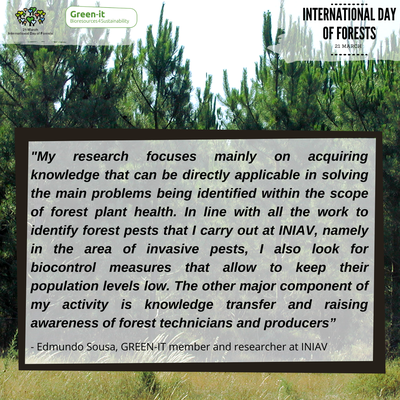International Day of Forests 2021
Covering 31% of the global land area, forests are home to 80% of the world’s terrestrial biodiversity. Not only do they provide habitat for a vast array of plants and animals and supply us the oxygen we need to survive, forests also protect our watersheds, supply nutritious foods and provide recreational spaces. And yet, every year we lose a forest size equivalent to the area of Iceland, leading to plant and animal extinction and to the emission of large quantities of greenhouse gases. The quick pace of forest loss and degradation has made the restoration and sustainable management of forests a top necessity.
In Portugal, forests make up for 6.2 million hectares (69.4%) of the mainland, essentially organized into four large groups: pine forests, evergreens (montados, cork oak and holm oak), deciduous (oaks, chestnuts and others) and silvo-industrial (eucalyptus). In the last years these spaces have suffered major changes caused by human intervention and environmental disturbances, such as fires and drought, increasing forest susceptibility and gradual appearance of photosanitary problems. There is also a rising risk of introducing new species of pests and pathogens due to the increased circulation of forest products or derivatives, or through natural migration due to climate change.
From Instituto Nacional de Investigação Agrária e Veterinária INIAV, GREEN-IT member Edmundo Sousa is dedicated to understanding and assessing the mechanisms involved in the decline of the Portuguese Forest, whether of biotic or abiotic origin. Through the study of the bioecology of forest insects, the interactions tree-insect-fungus-nematode and the resistance mechanisms of trees such as pine, chestnut, eucalyptus and cork oak, against insect attacks, Edmundo looks for ways to control or prevent the damage made by insect pests, particularly the xylophagous insects, who feed off of wood and act as vectors for other damaging organisms.
 Edmundo Sousa also studies the effects of climate change on tree-insect interactions and the temporal and spatial progression of forest pests, altogether working for the establishment of a national network of prospection for forest pests and diseases and the definition of control strategies, with the ultimate goal of a better and more sustainable forest management. “My research focuses mainly on acquiring knowledge that can be directly applicable in solving the main problems being identified within the scope of forest plant health” explains Edmundo. “In line with all the work to identify forest pests that I carry out at INIAV, namely in the area of invasive pests, I also look for biocontrol measures that allow to keep their population levels low. The other major component of my activity is knowledge transfer and raising awareness of forest technicians and producers.”
Edmundo Sousa also studies the effects of climate change on tree-insect interactions and the temporal and spatial progression of forest pests, altogether working for the establishment of a national network of prospection for forest pests and diseases and the definition of control strategies, with the ultimate goal of a better and more sustainable forest management. “My research focuses mainly on acquiring knowledge that can be directly applicable in solving the main problems being identified within the scope of forest plant health” explains Edmundo. “In line with all the work to identify forest pests that I carry out at INIAV, namely in the area of invasive pests, I also look for biocontrol measures that allow to keep their population levels low. The other major component of my activity is knowledge transfer and raising awareness of forest technicians and producers.”
21st March marks the International Day of Forests, which looks to celebrate and raise awareness about the importance of all types of forests. The theme of the International Day of Forests 2021 is “Forest restoration: a path to recovery and well-being”. The restoration and sustainable management of forests is crucial to address the climate-change and biodiversity crises and leads to the production of goods and services for sustainable development, fostering economic activity that creates jobs and improves lives.


